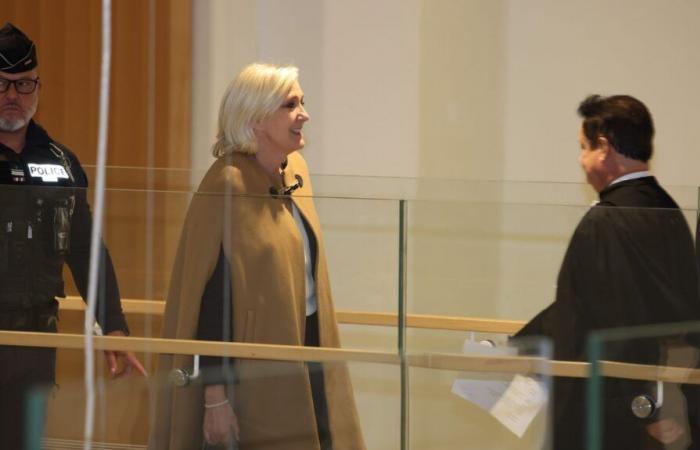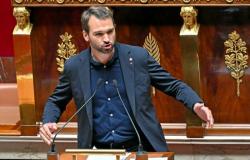All the figures of the National Rally denounce a political trial, after the requisitions of the Paris prosecutor's office in the trial of the European parliamentary assistants of the former National Front, Wednesday November 13. In particular, he requested five years in prison, two of which could be amended, and five years of ineligibility for Marine Le Pen. If the court follows these requisitions, Marine Le Pen will not be able to run in the 2027 presidential election.
“The prosecution is extremely outrageous in its requisitions”denounced Marine Le Pen to the press just after the requisitions. Before continuing: “There was at least one event that could have made us smile if the facts were not so serious and the stakes so important. This is the admission of the prosecutor when she said: listen to this contract, I don't have any evidence, but I can't ask for release because it would hurt me too much.” This sentence, “It would hurt too much”is denounced from set to set by numerous elected officials of the RN, such as the deputies Jean-Philippe Tanguy on France 2, Sébastien Chenu, Mathieu Valet or even Thomas Ménage on BFMTV, and shared repeatedly on social networks.
First, let us clarify that this sentence was indeed pronounced by the public prosecutor Louise Neyton, in the middle of her indictment lasting more than nine hours. She was heard by at least seven journalists, including four from franceinfo and the others from BFMTV, from Parisian a you Figaro.
The members of the National Rally believe that this is a political opinion, the prosecutor's mask has fallen, and proof that her indictment is politically oriented. By reading this sentence out of context, we can indeed understand it in this sense. However, if we put it in the context in which it was uttered, it is not certain that it was a political opinion. It can also be a comment from the point of view of facts.
According to Stéphane Durand-Souffland, seasoned legal columnist for Figarocontacted by Vrai ou Faux, the prosecutor spoke at that time only on a single element of the vast file which is being examined by the courts, namely on the accusations of concealment of embezzlement of public funds which target Jean-François Jalkh, when he was parliamentary assistant to Jean-Marie Le Pen. Both are not being tried at this time for health reasons.
Louise Neyton, prosecutor, explained that she had a deep conviction that this concealment of embezzlement had indeed taken place, in view of the rest of the file, the numerous evidence of what she calls a “organized system” of embezzlement of funds from the European Parliament to finance the former National Front, but that she did not have absolute proof on this specific part. And it is because it was contrary to this deep conviction that asking for release would have made him “too bad”to use his expression.
Precisely, according to Vincent Vantighem, journalist at BFMTV who transcribed the requisitions progressively on the social network X, she declared: “I can't ask for a release [partielle]. It would hurt too much. I therefore relate [à la décision du tribunal]…”
To say that this sentence reveals secret plans of the prosecution which would like to attack the RN for political reasons is therefore an interpretation. The prosecutor, for hours and hours, detailed all the other substantiated facts which are accused of the RN and in particular of Marine Le Pen who played, according to the public prosecutor, a “primary role” in the misappropriation of public funds for the benefit of the FN.
Furthermore, you should know that magistrates have the right to express themselves freely. “Speech at the hearing, within the framework of the legal debate, is free”explains Ludovic Friat, the president of the Union of Magistrates, to True or False, whether it concerns the prosecution, the defense or the civil parties.
This freedom of expression is enshrined, as recalled by the Superior Council of the Judiciary in an opinion sent to the Ministry of Justice in May 2023, after a request from Éric Dupond-Moretti when he was Minister of Justice. “The guarantee of freedom of expression for magistrates is ensured both by the Constitutional Council and the Council of State as well as by the European Court of Human Rights”explains the CSM.
However, this freedom of expression is regulated, in particular by the organic law relating to the status of the judiciary which dates from 1958. Its article 10 states that “any manifestation of hostility to the principle or form of government of the Republic is prohibited to magistrates, as is any demonstration of a political nature incompatible with the reserve imposed on them by their functions. The public expression of magistrates cannot harm impartial exercise of their functions nor undermine the independence of justice”.
“Any breach by a magistrate of independence, impartiality, integrity, probity, loyalty, professional conscience, honor, dignity, delicacy, reserve and at the discretion or duties of his state constitutes a disciplinary offense”adds article 43.






